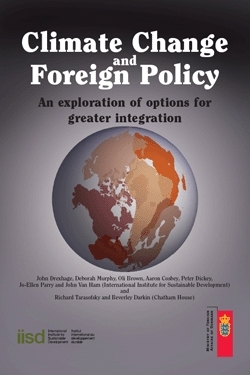Climate Change and Foreign Policy: Preface
Climate change is one of the biggest challenges of this century. It is a global challenge that calls for global solutions. There is a need to think out of the box. Business as usual is no longer adequate. Foreign policy must do its part.
The threat of climate change is not only global. It is also multidimensional, invisible, unpredictable, and transcends national borders. Traditional strategies and alliances are becoming ineffective against climate change, when the cause (greenhouse gas emissions) is not the result of a “hostile” enemy. Addressing the challenges posed by climate change along with threats such as terrorism, poverty and conflicts calls for new thinking in foreign policy.
It is against this background that the Danish Foreign Ministry has called on the International Institute for Sustainable Development to carry out a research study on the role of foreign policy in fostering a more effective international response to the challenge of climate change. The scope of the study has been to look at instruments that are relevant to Danish foreign policy.
First, the study has highlighted a number of areas where foreign policy can further the climate change agenda in diplomacy and foreign relations within the European Union, transatlantic relations, Arctic issues and United Nations affairs. This includes better integration of climate change into the EU’s Common Foreign and Security Policy, the Lisbon Agenda, and incorporating climate change in the work of a wide range of bodies under the United Nations.
Second, given the increasing political priority to energy security, the study points to how the promotion of climate-friendly energy solutions and adequate and reliable supplies of energy should be addressed in tandem in a broad foreign policy context. Given Denmark’s position in the fields of renewable energy and energy efficiency, the study points out the potential for a reinforced role of Danish private-public partnerships in this regard.
The study, thirdly, identifies peace and security issues related to climate change and how foreign policy could play a role in addressing them. A major challenge is that the threat feels abstract and the measures are poorly defined. While climate change may not be the sole cause of a conflict, climate-induced environmental stress may worsen local and regional tensions over scarce natural resources and increase the number of refugees from countries suffering from the consequences of climate change.
Fourth, with regard to trade and investment, the study identifies how foreign policy could influence the inclination of nations to engage in international climate change efforts, how climate change efforts may benefit from screening of outcomes of WTO negotiations, and how improved standards for climate change could be used for the screening of export credit projects.
Finally, the study emphasizes how development cooperation can provide the means to help developing countries deal with climate change within the framework of national development goals and the Millennium Development Goals. While the role of development cooperation in high-emitting developing countries is limited, development assistance, according to the study, has a particularly important role in assisting Least Developed Countries adapt to the negative impacts of climate change.
Within these foreign policy domains, the study has identified a number of opportunities for addressing climate change. In doing so, the study suggests that integrating climate change into foreign policy could enhance the ability and willingness of nations and the international community to meet the challenges of climate change.
I want to thank the International Institute for Sustainable Development for having contributed with innovative and timely thinking on how foreign services can play a stronger role in the fight against climate change. In particular, I want to thank the President and CEO of the Institute, David Runnalls, and the Director of the Institute’s Climate Change and Energy Program, John Drexhage, and the team working with them on this important task. I hope that the study will give inspiration to the foreign policy community and beyond in the efforts to strengthen the international response to climate change.
Ib Petersen
State Secretary, Ambassador
Ministry of Foreign Affairs
Denmark
|
|
